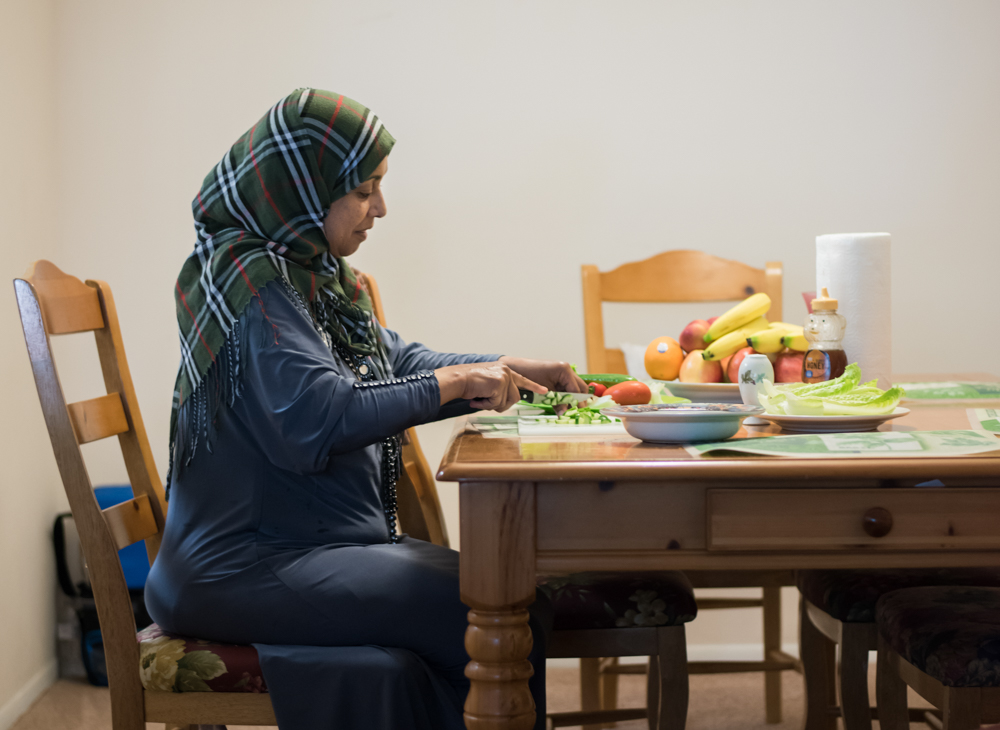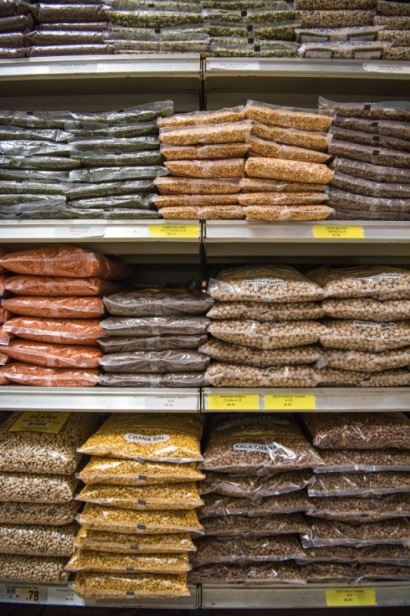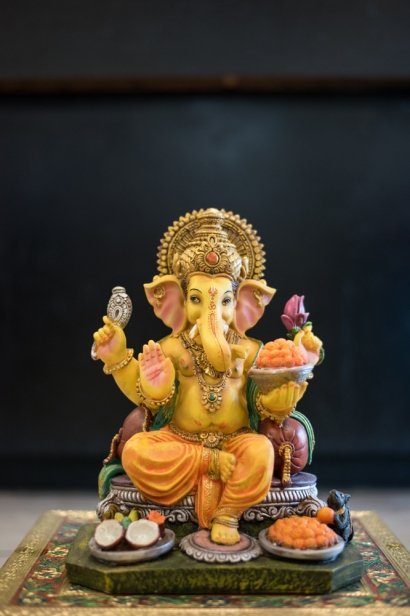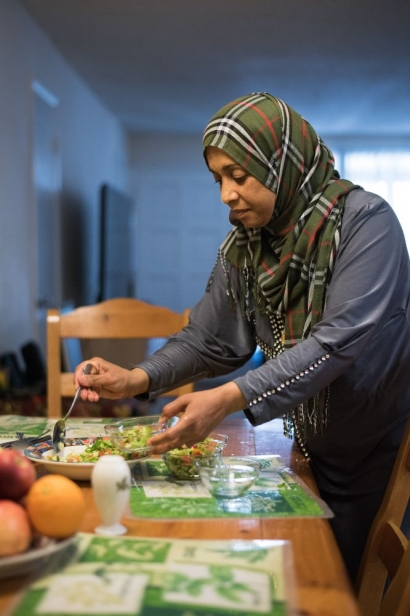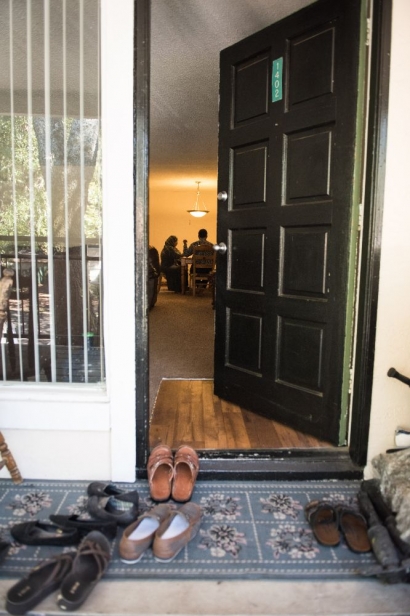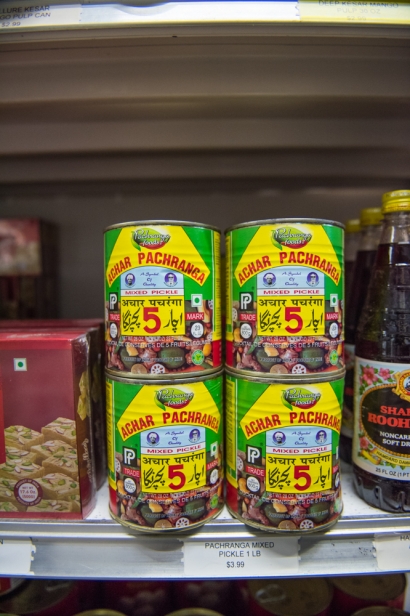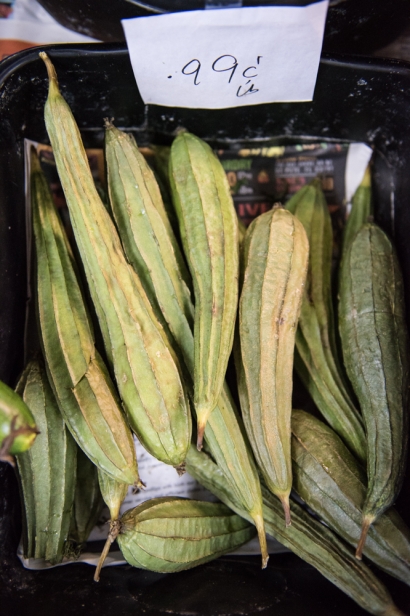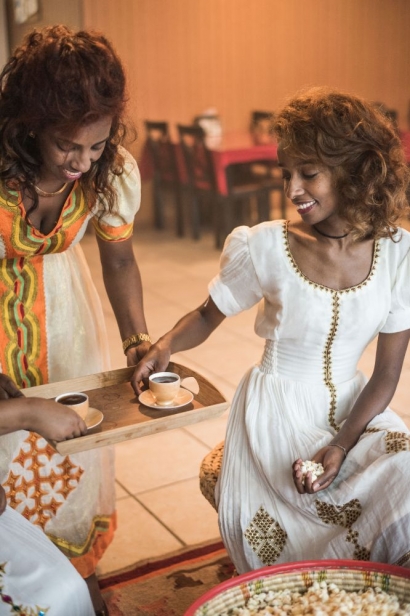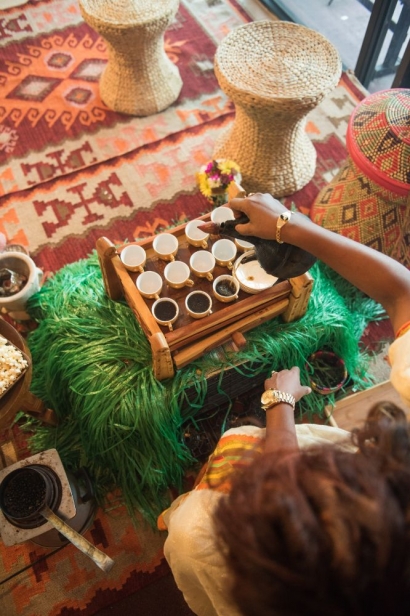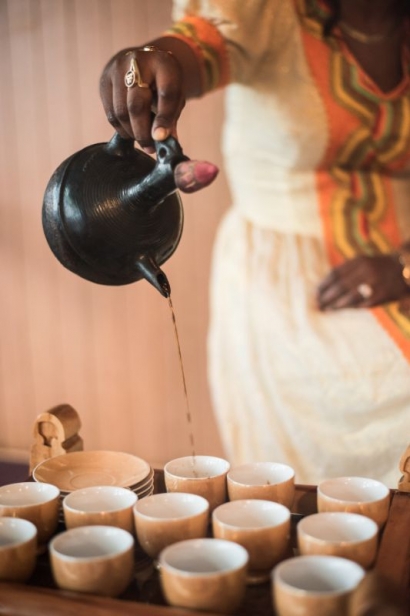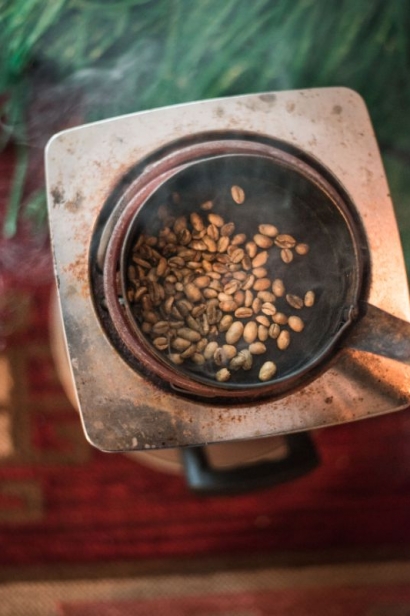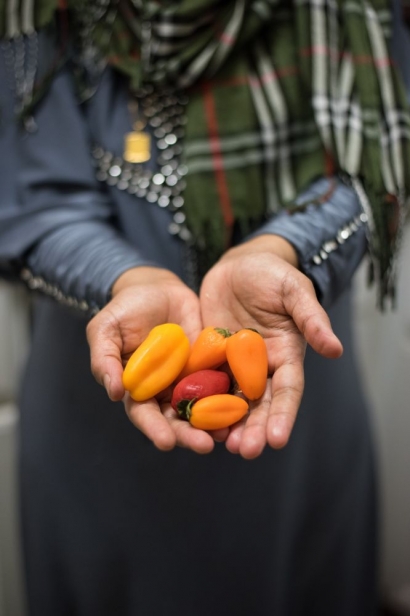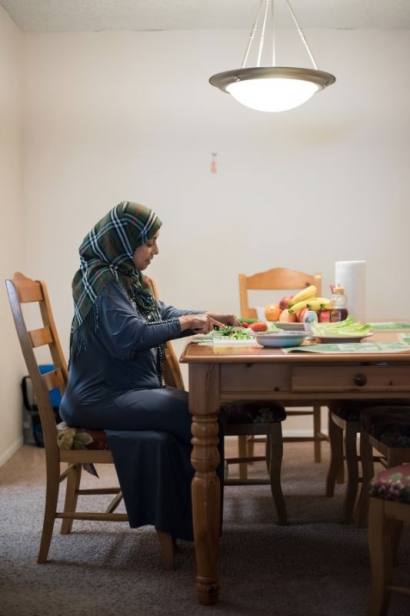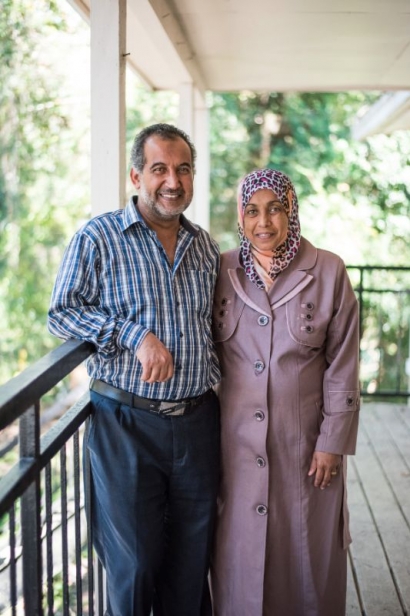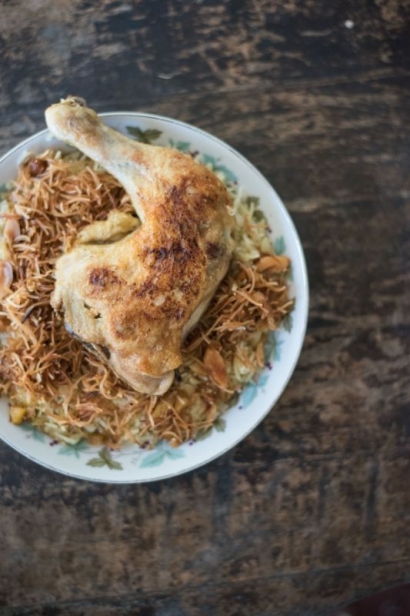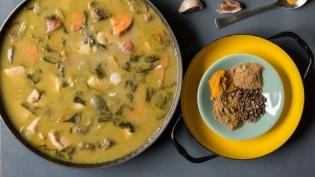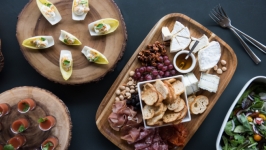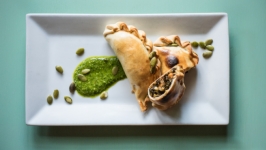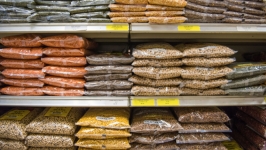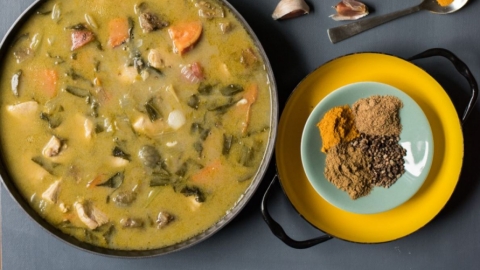Seeking Refuge at the Table
For most of us, the closest we will ever get to traveling Asia is enjoying a great meal at a restaurant here in NE Florida—digging into pad thai or nam sod, with its garnish of a bright carrot crane or radish flower, a slice of lime and vibrant mix of flavors. A simple dish can express so much about the tone and feel of a place, no matter how distant.
Food is a language that acts as a bridge between cultures, unlike other media except perhaps music. But unlike music, food activates memory through a full sensory experience: the taste of a spice, the smell of baking bread, the sight of persimmon flesh, the sound of a teakettle coming to boil, the smooth touch of mousse to the tongue. Food and drink provide humanity a common language of experience to explore our diversity without speaking a single word.
When you walk into Amith Patel’s market, Raja Indian Spices, on Baymeadows Road, there is a small pushcart to the left of the door. Sitting on top of it is a clear plastic bag of what looks like square caramels. “They are dried cheese. The Nepalese eat it. They chew it like gum,” says Amith. Everything on the pushcart is specialty ordered, not for his regular Indian customers but for refugees from all over the world: Syria, Lebanon, Burma, Ethiopia, Iran, Cambodia, Colombia, Iraq, Nepal, Bosnia, Sudan. Every year 70,000 refugees are brought to America, and about 2,000 find sanctuary in Northeast Florida.
“There is a difference between a refugee and an asylum seeker. A refugee is forced out, not by choice. They then apply for refugee status at a camp,” says Amber Dodge, orientation specialist with Lutheran Social Services. “Sometimes they have to wait as long as 15 to 20 years in the camps. Then our government flies them here and places them in different cities.”
This history of Jacksonville as a refugee resettlement community in many ways can be linked to one woman, Elaine Carson. Known as “Mrs. P”, a pastor’s wife who spent much of her young adult life doing missionary work, she focused her attention on the Soviet Union. In 1988, Lutheran Social Services called on her to help an extended family of 30 Ukrainians make Jacksonville their home. After settling many more families, World Relief Organization asked her to open an office on the First Coast. Because of its strong faith-based social service organizations, Jacksonville is designated as a refugee resettlement city by the federal government and has welcomed thousands of people to start new lives here.
Many of the refugees come from a rural life. The culture shock combined with a total language barrier can make settlement in America more than daunting. They often seek out restaurants and markets that have a cuisine they recognize as the comforts of home.
Raja Indian Spices serves this global community as a common marketplace where refugees can find a taste of home.
“It was like a challenge when we first opened up. We had no knowledge about their culture or food,” says Amith. The Patels did their research, speaking with suppliers and vendors in other markets like Atlanta, as well as customers, about how best to stock their store. “Today, we are proud to say being an Indian grocery, we serve more non-Indian customers,” he says. They carry special fruits, vegetables and, most importantly, spices.
“As you know, your recipes are incomplete without your spices,” says Amith. It is the spice that makes a meal unique to a culture.
A few doors down from Patel’s shop is Ibex Ethiopian Kitchen, a restaurant owned by Tsion Chikesmo and her husband, Teddy Aboye. The couple both arrived in America as refugees from Ethiopia over a decade ago. They settled in Jacksonville after initial placement in different states.
“When I first came to Jacksonville, I went to a restaurant on Atlantic Boulevard, the Queen of Sheba,” says Teddy. “It was an Ethiopian restaurant. I was looking to find a roommate, so I asked the restaurant owner. Within in a month, she helped me find a roommate.”
Today, Teddy is a math instructor at Keyser College, while Tsion is a chef/restaurant owner. On any given day, Tsion can be found in the kitchen at Ibex, creating traditional Ethiopian fare for hungry customers of all nationalities, but mainly Africans. She hails from the Gurage District of Ethiopia, a region known for its incredible cuisine. Some of her customers come in to eat every meal, three or four times a day, especially when they are new arrivals to America.
“Restaurants are good transition places, particularly for older people. They have been eating the same food for years, all of their lives, and they come here if they don’t cook at home,” says Teddy. “I hear people talking in the restaurant too. It is like a bridge. An American will ask an African a question about the menu, and then a conversation starts.” Ibex is a warm space, with wood-paneled walls and beautiful drawings of Ethiopian culture hanging above the tables. There, Teddy and Tsion serve the Ethiopian refugee community far outside the realm of food service. They help people find work. Find a car. Find a home. On Sundays, they host a traditional Ethiopian coffee ceremony, revolving around the sharing of conversation, a ritual from home.
Coffee originates from Ethiopia. “Coffee is the backbone of Ethiopia. Seven days a week, sometimes twice a day, people have neighbors over to their home and they gather over coffee to connect about the day,” says Teddy.
In Iraq, the tradition is to gather over tea. Muhammed Issa Al Marzok and his wife, Safid Essa, and four children have been in America just over one year. They fled Iraq in 2006, crossing as refugees into Syria, where they lived for six years waiting to be granted refugee status. “The UN office is so small. It is tiny,” he says as he outlines a square with his hands. The processing of the thousands of refugees takes on average five years. Muhammed and his family lived in a camp in Syria for six years, before returning to Iraq. “Things were getting too bad in Syria, so we went home to Basra,” he says. Two years back in Iraq, the phone rang and they were told to come to America. They landed in Jacksonville in May 2014 with their lives packed into a few bags.
Amith’s market is not too far from Muhammed’s home. In Raja Indian Spices, near the bins of fresh vegetables is a cooler full of breads ranging from naan to pita to more obscure varieties. He does his best to have a little of something for everyone. If he doesn’t carry an item, he uses Google translator to find out exactly what his customer is looking for.
“They always tell me that we are one people divided by borders and religion,” he says. “We help people with their paperwork, find jobs and housing. These people have lost everything. They have a hunger to achieve and be successful in life. They want their children to have a brighter future, and they love this beautiful country. There is a reason why they are here.”
There is an old adage that says the fastest way to a man’s heart is through his stomach. Northeast Florida has become a global refuge for people who are starting life over from scratch. For these weary settlers, our small markets and ethnic restaurants have helped to mend the hearts of the homesick. For locals, they are an open door to the rich diversity that makes our region so unique. Walk through it, and ask what’s on the menu. The world’s table is a beautiful reminder of the common thread that binds us all.


